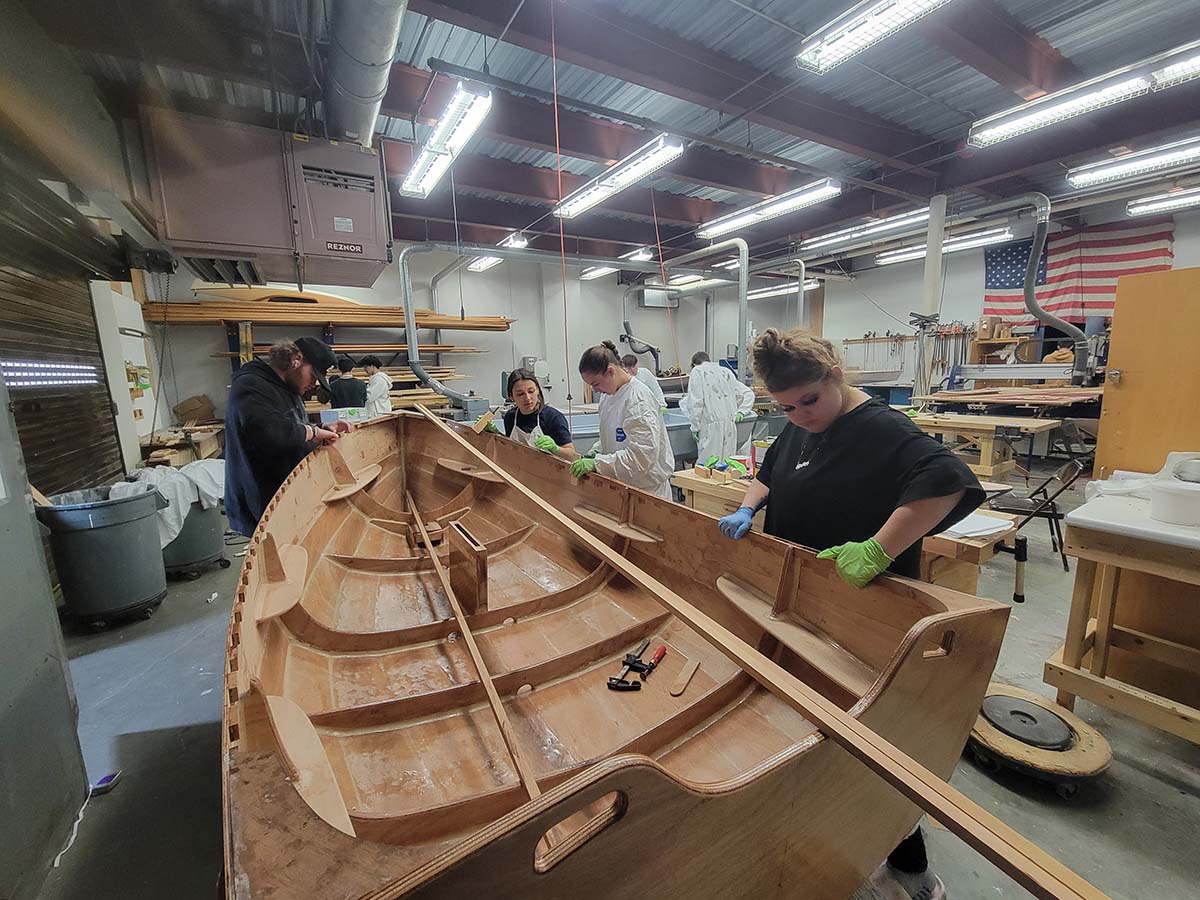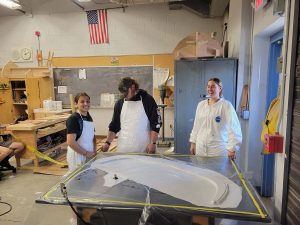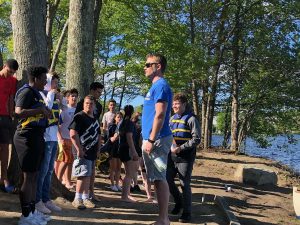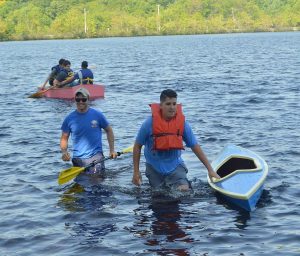
Building Tomorrow’s Workforce
Published on June 29, 2023As interest in boating rises, the workforce needed to build, maintain, and store those boats is not rising at an equal pace. In response, the marine industry has shown a renewed enthusiasm to draw teens and young adults into recreational boating careers and find means to train the next generation of workers. From a national to a local level, efforts are underway to ensure there are skilled workers ready and able to keep the boating industry growing well into the future.
On a National Level
The American Boat & Yacht Council (ABYC) is well-versed in the need for workforce training for the marine industry and has been leading the charge to reach more students. The organization is a key source of technical information for the marine industry, developing product safety standards and credentialing, but education and training opportunities are becoming a central part of its focus.
A main component of ABYC’s workforce training efforts is its Marine Trades Accreditation Program, which is run through the ABYC Foundation. The program provides a third-party review of high school and post-secondary marine technology curricula, supplies, and instruction to help ensure the quality and quantity of courses meet the needs of the boating industry.

Another component in ABYC’s educational mix is its longstanding Marine Service Technology Program, which is a curriculum that schools can purchase to develop their own programs. Marine service instructors in partner schools or who are using the curriculum have access to a host of educational resources and tools to build their own skills and capabilities, as well as the ability to network with fellow instructors throughout the country.
Turning to State Actions
The work of ABYC is an essential element to building a workforce, but sometimes state efforts can be more closely aligned with the needs of the marine industry in that state and have better access to legislators who can help push across much-needed funding and support for marine educational programs. With that in mind, many state marine trade associations across the country are addressing future workforce needs, either through something as simple as offering annual scholarships to students pursuing careers in the industry, or as complex as creating a subgroup within their organization to address educational and training needs.
A prime example of a state association embracing workforce training is the Massachusetts Marine Trades Association (MMTA). The association’s success has been a result of being in a state that has long recognized the value of the boating industry, combined with an executive director and board that prioritize workforce training.
For Randall Lyons, executive director of MMTA, the reason for all areas of the marine industry and trade associations to be involved in workforce issues is simple. “We’re lucky to work within the recreational industry because our customers are happy. But they are not happy if they have to wait for their boat to be built, repaired, or launched. And if they aren’t happy, they may not continue to be boaters. That loss hits all of us.” There is a direct correlation between boater wait times and the number of employees who are available to assist them, which is why training and education are critical.
Expounding on the happy boater, skilled worker connection has been a key lobbying point for the MMTA, which Lyons said is fortunate to have the legislative and lobbying services of Jamy Madeja of Buchanan and Associates, who not only knows the right people for the association to connect to but is extremely knowledgeable about the marine industry. Massachusetts has a substantial boating caucus in the Senate and the House, and Lyons said having Madeja’s connection to the government has proven fruitful as the MMTA has received about $150,000 in annual funding for the past several years. The money has come through the Department of Elementary and Secondary Education and the Department of Labor and Workforce Development.
A branch of the MMTA, the Massachusetts Marine Trades Educational Trust (MMTET)The MMTET was put in place to attract more young people to careers in marine trades while also providing education and training. The organization provides information on careers, schools and training programs, scholarships, and available jobs through its website. Right now, there are about ten schools with existing programs that MMTA supports with money for projects and tools, filling advisory board positions, attending career fairs, and connecting MMTA members with the schools to offer employment to students.

“We’re trying to start and support new programs at schools, connecting them with manufacturers like Yamaha to create intro programs and then expand to full curriculums,” Lyons said. He gave the example of Whittier Regional Vocational Technical High School, which started a 100-hour intro course with Yamaha and ran it three times with financial support through a state grant. The school then obtained permission through the state rules that guide vocational-technical education, to start a new day program for marine technology, which kicked off this year with 15 students. Those trainees will receive a Marine Technician Certification upon graduating from high school.
Bringing it Local
Building a skilled workforce is a priority, but skilled workers would not be skilled if it were not for teachers. Growing a workforce of marine industry teachers is also part of the plan. Recognizing this fact, the ABYC Foundation distributes an annual Educator of the Year award to celebrate those who are ushering in the next generation of marine technicians. The nominations can be for high school or post-secondary teachers, or industry instructors who specialize in marine service technology. According to Sarah Devlin, ABYC’s education director, the reviewers look at how nominees impact students’ lives as well as the industry.
This year’s winner was Kevin McKiernan, a teacher at North Providence High School in Rhode Island who was nominated by Russ Clearo of RC Marine Electric. “Immediately, I noticed Kevin was nominated by someone in the industry who said he would have no problem employing any student that he knew had been instructed by Kevin. After I talked to one of his (Kevin’s) former students and witnessed the role Kevin played in his future career in the marine industry, I felt I needed to include him on my short list for further review. Ultimately, Kevin won,” Devlin said.
McKiernan’s entry into the marine trades is a similar story to many of today’s students. He found himself in a common position as a high school graduate—he tried college, but it wasn’t the right fit for someone who preferred to work with his hands. He was working on hardwood floors when he came across an ad for the International Yacht Restoration School (IYRS) in Newport, Rhode Island, and he jumped at the opportunity to attend. After finishing there, he began boat building at Old Pointe Marine in Newport and embraced the continuing education and workshops that IYRS offered its graduates. He eventually landed at North Providence High School teaching Marine Trades, which includes two years of boat building and one year of systems. “The program was built from the district’s boat building program that they started in the middle schools as a way to teach kids math. The Administration and mayor loved the program and wanted to continue the momentum that the middle school program had started,” McKiernan explained.

With about six years of teaching at North Providence under his belt, McKiernan has taught what he refers to as “the most diverse student body of any other pathway in the school, touching National Honor Society kids to those who are a bit less enthused about school.” The diversity of his students comes from the unique structure of the program that skips lectures and written assignments for hands-on work and field trips.
“My goal is to build boats and have the kids have fun doing that. I do come at it from a workforce development angle in that I want to send these kids into the trade. My small place in the pipeline of marine workforce development is to garner interest in kids and build their love of boats,” McKiernan said. Along the way, he also teaches a strong work ethic and camaraderie. “I teach them how to have a good time and get stuff done at the same time,” he said. He commented further that he has pretty high standards for quality workmanship and doesn’t suffer laziness.
The students build kayaks their first year and then another type of boat, the type of which depends on their skill level, the second year. At the end of each year, they have a launch day and eventually, the boats are raffled off or sold in the community.
McKiernan considers himself fortunate to live in a state that is highly supportive of the marine trades, from the RI Marine Trades Association to the other boatbuilding schools and programs, to local businesses that take time out of their day to do tours for his students or offer hands-on experiences like how to spray or do oil changes on generators. He refers to it as a whole workforce development ecosystem that is working to help students with no prior experience develop a love for being on the water. “The kids I teach are an untapped labor resource, and like happened to me, the right exposure will lead them to want to become a part of the industry.”
| Categories | |
| Tags |




